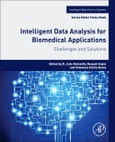Intelligent Data Analysis for Biomedical Applications: Challenges and Solutions presents specialized statistical, pattern recognition, machine learning, data abstraction and visualization tools for the analysis of data and discovery of mechanisms that create data. It provides computational methods and tools for intelligent data analysis, with an emphasis on problem-solving relating to automated data collection, such as computer-based patient records, data warehousing tools, intelligent alarming, effective and efficient monitoring, and more. This book provides useful references for educational institutions, industry professionals, researchers, scientists, engineers and practitioners interested in intelligent data analysis, knowledge discovery, and decision support in databases.
Please Note: This is an On Demand product, delivery may take up to 11 working days after payment has been received.
Table of Contents
1. A Review on Intelligent Data Analysis System for an IoT-Based Capsule Endoscopy System2. Ant Colony optimization-based image texture segmentation in medical images
3. A Feature Fusion Based Discriminant Learning Model for Diagnosis of Neuromuscular Disorders Using Single Channel Needle EMG Signal
4. Evolution of Consciousness Systems with bacteria
5. Analysis of transform-based compression techniques for MRI and CT images
6. Liveness Assured Multimodal Biometrics using Electrocardiogram for Smart Health Applications
7. Medical Image Retrieval System in PACS Environment for Clinical Decision Making
8. A Neuro Fuzzy Inference Model for Diabetic Retinopathy Classification
9. Predictive Analysis of breast cancer using machine learning techniques
10. Right Ventricle Image Segmentation from MRI using optimization techniques
11. Computational Automated System for Red Blood Cell Detection and Segmentation
12. Fuzzy logic based approaches for gene regulatory network inference
13. Evolutionary Algorithm with Memetic Search for Optic Disc Localization in Retinal Fundus Images
14. A novel approach of targeting prognostics of Bruxism disorder using C4-P4 channel of EEG signal
15. Physiotherapy and Rehabilitation Assessment System Using Bio-inspired Visual Cortex Computational Model
16. Classification of Myocardial Ischemia in Contrast Enhancement Using Machine Learning
17. Simple link sensor network based remote monitoring of multiple patients
18. Prognosticating the risk of fibrosis progression in non-alcoholic fatty liver diseases
19. Alzheimer Disease Detection from Structural MR Images using Fuzzy C-Means based Deep Belief Neural Network
20. Optimal Control of Fractional Order HIV-Immune System Using Neural Network Approach
21. Diagnosis of Ocular Disease using Optical Coherence Tomography Image
22. Hybrid Approach for Classification of EEG Signals using T-F Images with Wavelets and Texture Features








